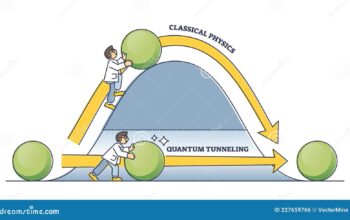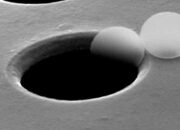The perennial debate regarding whether physics or chemistry is more fundamental has elicited considerable discourse among scientists, educators, and philosophers alike. Both disciplines contribute uniquely to our understanding of the natural world. Yet, the quest to ascertain which one occupies the foundational tier prompts an exploration of their interdependence, methodologies, and implications. This analysis endeavors to unpack the intricate relationship between physics and chemistry while offering insights into why discerning their hierarchy is complex.
To commence, it is imperative to delineate the fundamental tenets of both fields. Physics, at its essence, is the study of matter, energy, and the interactions between them. It seeks to formulate universal laws, articulated through mathematical frameworks, that can elucidate the behaviors of the cosmos, from subatomic particles to vast galaxies. Conversely, chemistry focuses on the composition, structure, properties, and changes of matter, particularly at the molecular and atomic levels. It seeks to explain phenomena through the interactions and bonds formed between atoms and molecules.
One might argue that physics serves as the bedrock of all sciences. After all, it provides the foundational principles that govern the natural world. The laws of thermodynamics, electromagnetism, and quantum mechanics underpin various chemical processes. For instance, the behaviors of gases as described by the ideal gas law find their justification in kinetic molecular theory—a concept grounded in physics. Moreover, the periodic table, a cornerstone of chemistry, can be traced back to the underlying principles of atomic structure dictated by quantum mechanics. In this regard, physics can be viewed as the ultimate arbiter of natural laws that govern not only chemical reactions but also all physical phenomena.
On the other hand, chemistry offers unique perspectives that physics alone may not encapsulate. While the mathematical elegance of physics elegantly models the universe, chemistry emphasizes the intricate relationships and transformations that occur at a molecular level. The emergent properties of compounds, which cannot be simply deduced from the behavior of individual atoms, highlight instances where chemistry diverges significantly from physics. For example, water exhibits properties—such as its high specific heat capacity and surface tension—that are not readily inferable from the properties of hydrogen and oxygen in isolation. Such complexities imply that chemistry, with its focus on molecular interactions, presents a richer tapestry of information regarding matter.
Additionally, the interdisciplinary synergy between physics and chemistry must be acknowledged. The subfield of physical chemistry exemplifies this collaboration, wherein chemical phenomena are examined through physical principles. The precise measurement of reaction kinetics often employs spectroscopy—a technique grounded in physical methodologies. Here, it becomes evident that the two disciplines are not juxtaposed but rather intertwined, fostering a holistic understanding of scientific principles. This convergence raises pertinent questions: Does the existence of physical chemistry diminish the claim of physics’s foundational role, or does it affirm the interdependence of the two fields?
Furthermore, the epistemological frameworks that underpin both disciplines warrant examination. Physics frequently relies on deductive reasoning, employing mathematical models to predict outcomes under specific conditions. In contrast, chemistry often adopts an inductive approach, with empirical data guiding the formulation of theories. The nature of experimentation in chemistry frequently involves manipulating variables and assessing resultant changes in behavior—an aspect where chaotic phenomena complicate predictive modeling. Hence, while physics can create idealistic frameworks based on definitive variables, chemistry often navigates the murky waters of real-world complexities.
In considering methodologies, the pedagogical approaches within each discipline also reveal substantial differences. Physics education often emphasizes problem-solving and analytical skills through quantitative methods. On the other hand, chemistry blends qualitative and quantitative analyses, often requiring an understanding of intricate concepts such as molecular geometry and reaction mechanisms. This pedagogical disparity reflects deeper philosophical differences—physics as a pursuit of abstraction versus chemistry as an exploration of tangible interactions.
The historical context further enriches this discussion. The inception of modern chemistry can be traced back to principles derived from physics, yet significant developments in the 19th century, such as the discovery of the periodic law by Dmitri Mendeleev, established chemistry as a distinct domain of inquiry. As a result, chemistry cultivated its own methodologies and theoretical foundations, distinguishing itself while simultaneously remaining tethered to the principles of physics.
Considering recent advancements in both fields, discussions surrounding quantum chemistry exemplify how the elemental properties of physics pervade chemical understanding. Quantum mechanics undergirds chemical bonding theories, effectively bridging the divide between the two domains while reiterating the significance of both disciplines. Moreover, contemporary research in materials science illustrates the evolving boundary between physics and chemistry, where the properties of new materials are often explicated through an amalgamation of principles from both areas.
Ultimately, the question of whether physics or chemistry is more fundamental transcends the realms of simplistic comparison. The profound interrelation of both sciences reveals that they are, in fact, complementary facets of a broader scientific pursuit. Physics may underpin the fundamental principles of the universe, but chemistry intricately explores the manifold ways those principles manifest in the complex tapestry of matter. Thus, rather than ascribing a hierarchical status to either discipline, a more enriching perspective appreciates their symbiosis as a cornerstone of scientific inquiry, where the interplay between the fundamental and the emergent illuminates the wonders of the natural world.












